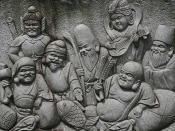Every piece of knowledge, from knowing what a tree is to advance math, is a direct result of questioning. To actually know something, one must have not known it before and thus questioned what it was that wasn't known. Starting from birth, one has questioned everything around them. Questioning is a fundamental privilege that one has in order to gain knowledge of things that aren't clear and certain. Similarly, the mystery of the existence of an infinite being has always been sought after. When commenting about God, a loyal believer will say that we must have faith, meaning in that particular context, that we must believe because it is good to believe. Nevertheless, belief that something is true is only a virtue if it has been arrived at by an honest and consistent method, designed to minimize error as much as possible. In this definition, it is evident that faith has no grounds for a stable belief.
Although some may claim that it is wrong to question or doubt the existence of God, we are morally responsible to seek evidence for our beliefs.
To question whether or not there is a god means being open to the possibilities of a god or gods, but also to the possibility that there may not be any gods at all. If you assume ahead of time that there must be a god and set out to find evidence, you are not questioning, but skipping over the question straight to the answer and merely seeking confirmation of your preconceived bias. A person who questions god's existence is not being rebellious. Such a person admits to being only human in that they could be making a mistake, and seeks to find the truth in the matter. With any important question, one seeks to avoid error,


